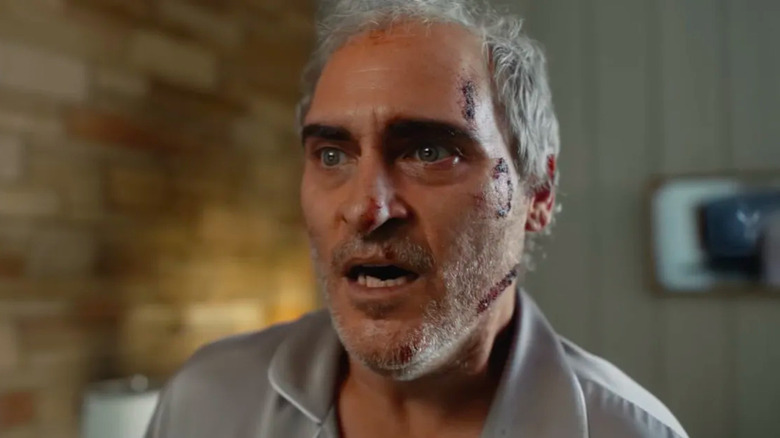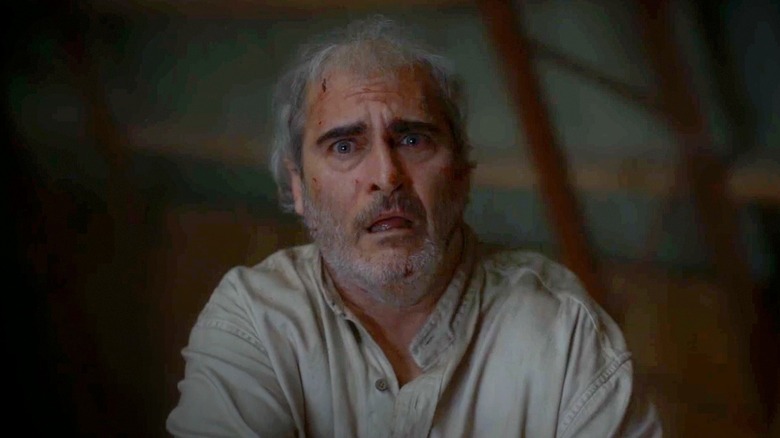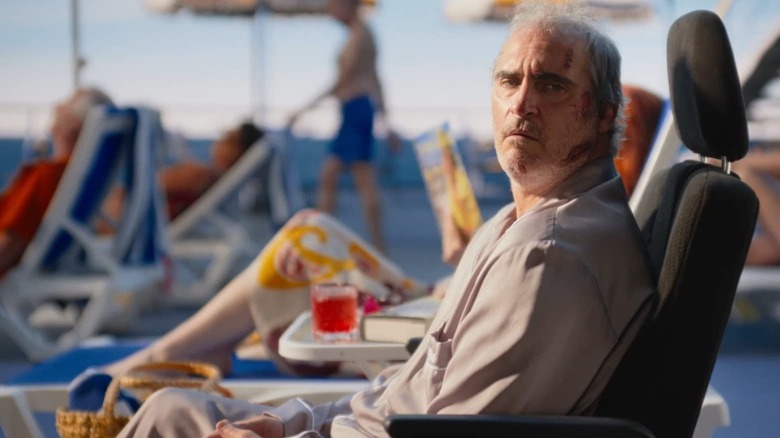
What is Beau afraid of? Everything. Everyone. It's a scary, chaotic world out there. Beau's world, in particular, seems terrifying. Ari Aster's "Beau is Afraid" is set in a world similar to ours, just ten times more haywire (and that's saying something). Outside his apartment, the street is full of deranged, screaming, dancing individuals, some downright violent and homicidal. Corpses lay untouched and rotting in these streets, and a serial assailant known as the Birthday Boy Stab Man is on the loose. Beau does not like to leave his apartment, but when he does and has to come back home, he must sprint to the front door of his building and make sure it's locked and shut behind him, or else everyone on the street will force their way inside and wreak havoc.
Not that the inside of Beau's apartment building is much better. The hallway to his apartment is so narrow it might as well be a coffin. Late at night, while Beau tries to sleep, his neighbor slips letters under his door demanding he turn down music that he's not even playing. It's as if every single moment, every single interaction, every single breath Beau takes is designed to send him cowering. His entire world seems to be hanging by a fraying string.
Aster drops us right into Beau's world. In fact, he opens with Beau being born — being practically ripped from his mother's womb against his will and brought into this world silent ... until a doctor smacks him on the ass and sends him into a screaming, crying fit. Decades later, Beau may not be outwardly screaming like his infant self, but there always seems to be a silent scream perched on his lips; the sense that the world is going to cause him to snap; to break; to scream out in confusion, pain, and horror at the madness seeping into everything, like fresh blood leaking through old cracks.
Beau Is Uncomfortable

This is Aster's most ambitious film yet; a big, strange saga that the filmmaker has called a "Jewish Lord of the Rings." It has the filmmaker's hallmarks — like both "Hereditary" and "Midsommar," the film revels in parental issues, strange communities, inexplicable situations, severe head trauma, and scary attics. But Aster also seems to be heavily influenced by Charlie Kaufman's "Synecdoche, New York" here, particularly in how he creates an expanding, surreal world and has his performers shift along with it. And like "Synecdoche," there's a profound, aching loneliness at the heart of it all. The sense that some of us are entirely alone, and that it's a loneliness we've created for ourselves and yet somehow can't control. We dug ourselves a lonely pit of a world, and now we can't climb up out of it.
Joaquin Phoenix is Beau, and it's fair to say that for all the big, bizarre set pieces Aster creates, the film rests on Phoenix's shoulders. He's one of our best-working actors; a performer with a type of feral intensity that is hard to pin down. He has profoundly sad, light eyes and a voice somehow garbled and lilting; musical in its own unique, nearly unclassifiable ways. Here, his voice sounds particularly lost and frantic; like there's a question on his lips for every word he utters.
Beau is getting ready to visit his mother (Patti LuPone), and it's clear from the jump this won't be an easy visit for him. During a session, Beau's therapist (Stephen McKinley Henderson) asks if Beau wishes his mother was dead. Beau is taken aback by the question, but the fact that the therapist is asking it at all is enough to send up a few signal flares. Beau's relationship with his mother, which we learn about slowly through flashbacks and other experiences, is clearly fraught, and a major source of Beau's anxiety. But he's determined to get back home — although that's easier said than done.
Beau Is Going Home

"Beau is Afraid" sends poor, terrified, anxious Beau on a strange journey home. He ends up injured and staying with a couple (Amy Ryan and Nathan Lane) who seem almost too happy to have him as a house guest. Later, Beau will come across a theatre troupe operating out of the woods — and just about to put on a play that feels tailor-made just for him. And no matter where Beau ends up, he's injured, or frightened, or driven to the point of cracking. Only an actor like Pheonix can keep up this perpetual horror and confusion, and he never wavers in his commitment to Beau's fragile emotional state.
Through it all, Aster peppers in more background sight gags than a classic episode of "The Simpsons." There are so many gags that "Beau is Afraid" all but demands you see it more than once (despite its three-hour runtime) to take them all in. About that runtime: there's some debate about how long movies have become lately, and while I certainly won't argue about that, I'm always reminded of a quote from Roger Ebert: "No good movie is too long and no bad movie is short enough." While the length of "Beau is Afraid" may seem unappealing, Aster makes every second count. The film's pacing, which moves Beau from one spot to the next like a piece on the world's most f***ed-up chessboard, is handled with care and skill. We're never bored — how can we be? The film is so chaotic and relentless that, like Beau, we have no choice but to get carried along.
Beau Is Afraid

There's a Freudian undercurrent to everything here. An analyst would have a field day with what Aster has created, and it begs the question: is Ari Aster okay? Does the writer-director see himself as Beau, a neurotic, terrified husk of a person? Or is he having a bit of fun and giving us a main character to puzzle over? In either case, while there's a sick, macabre, and hilarious sense of humor to it all, I never got the sense that Aster was mocking his main character. Beau is in shambles, but we're not meant to laugh at him in a mocking way. We're firmly in his shoes, and the cacophony of craziness is inflicted on us as much as it is on him.
"Beau is Afraid" is big, and weird, and kind of wonderful. There will be those who simply cannot stand the fraught world Aster has created here, and there will be others who are fully on board with what the filmmaker is dishing out. No matter the reaction, this is a film that begs for conversation and analysis and plenty of pondering. And it's more accessible than you might think, despite all the lunacy. Aster is primarily known as a horror filmmaker, and while "Beau" is not a horror film, there's plenty of the horrific here to knock us for a loop. Beau is afraid, and you will be, too.
/Film Rating: 8 out of 10
Read this next: The 95 Best Horror Movies Ever
The post Beau is Afraid Review: Joaquin Phoenix Goes on a Freudian Hellride in Ari Aster's Funny, Nightmarish Extravaganza appeared first on /Film.
